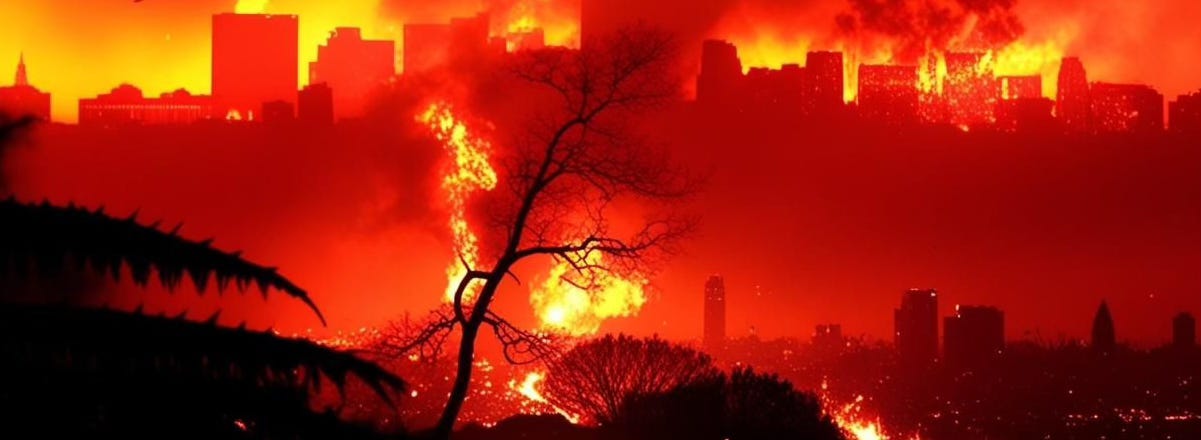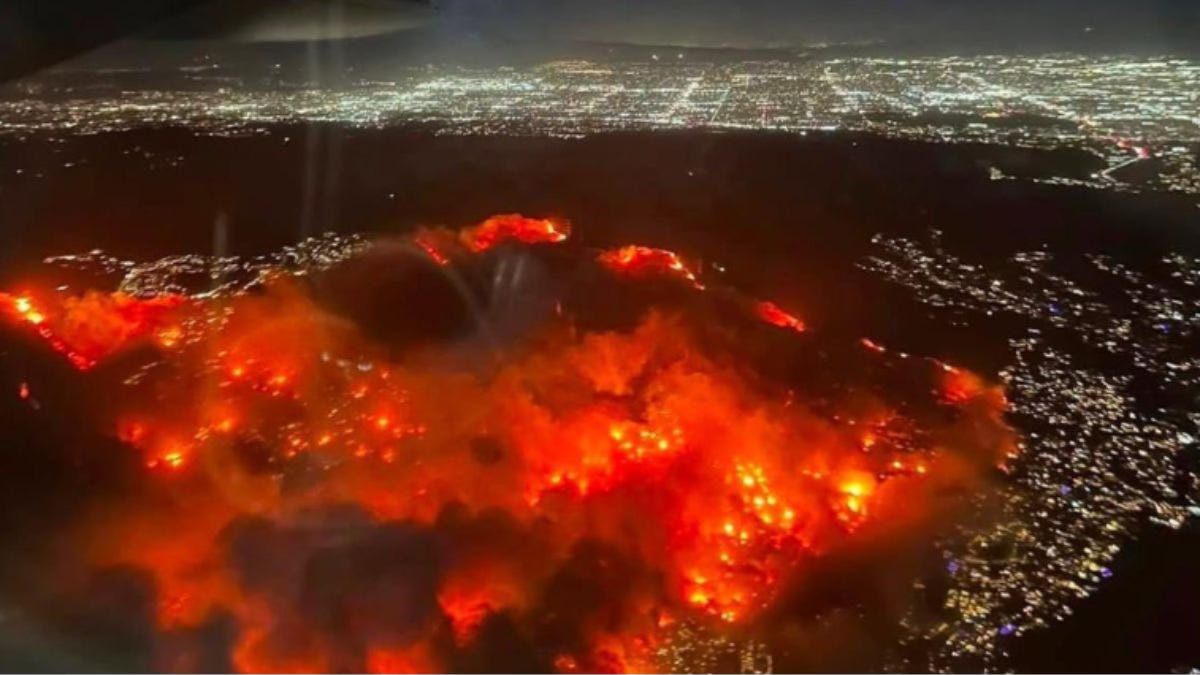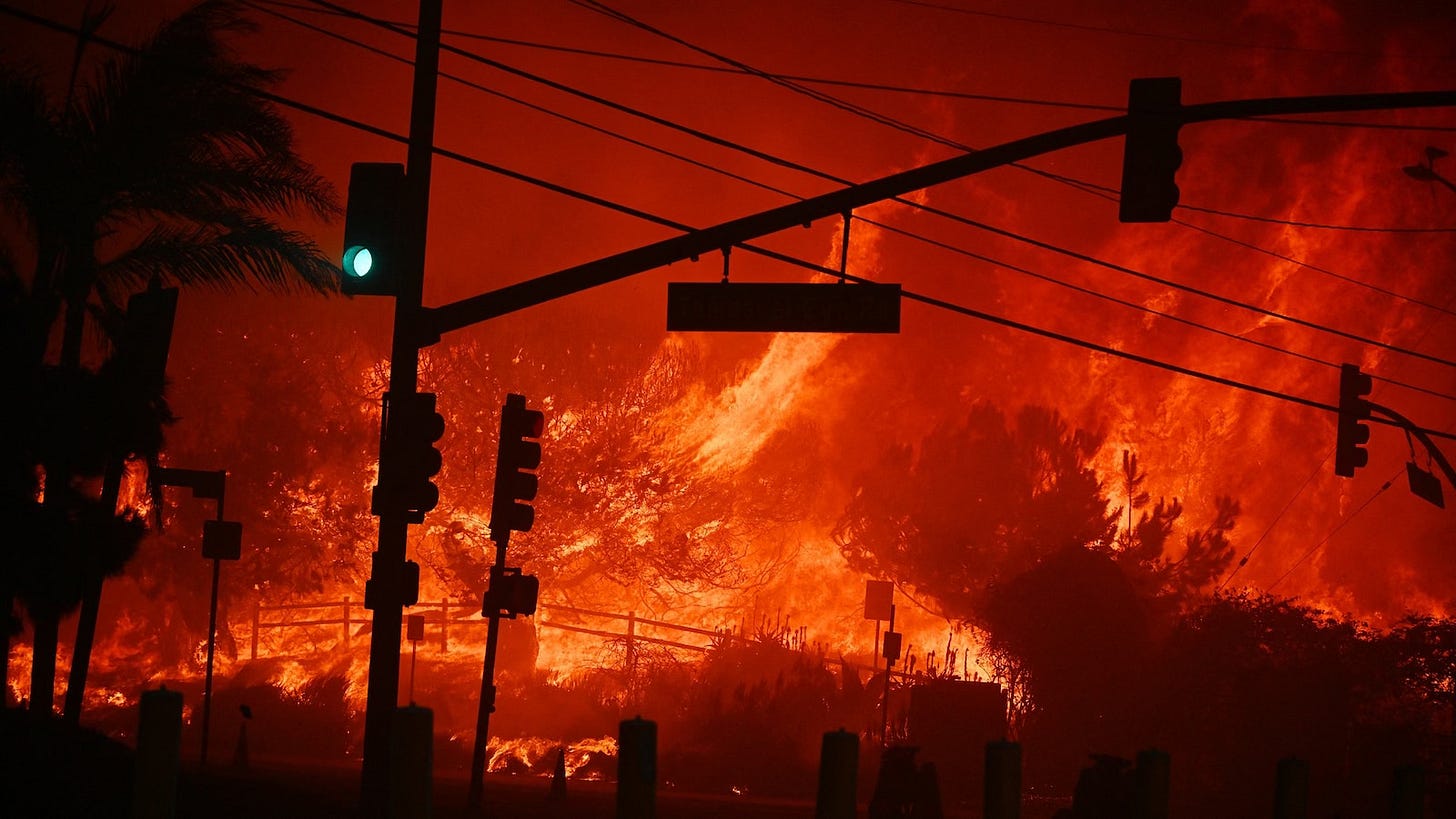The Fires This Time
Are the humongous urban fires that Los Angeles experienced with the beginning of a New Year an ill omen? If so, it doesn’t look good for L.A. during the rest of 2025.
The local news in Los Angeles for the past month has been about the huge fires burning in the hills that constitute part of the city. The hillside communities of Pacific Palisades and Altadena have been devastated as if they were in the center of a vicious war. In a way, it is a war, and the fires won. It didn’t have to end this way. Most of the blame has been laid on the inept leadership on our side. It’s probably true that many of L.A. leaders were not qualified for the job. But it’s also true that many other people fumbled, cheated, and stole the resources we need to quell the fires.
The fires, which began on January 7 are mostly “contained,” but not entirely out. Meanwhile the state has levied the insurance companies $1 Billion to help pay for the disaster.
Too Much Land, Too Little Compassion
The Los Angeles Times, another sinking newspaper, recently ran an exposé about a $4 billion corporation called Wonderful Pistachios that is owned by a very rich couple, Stewart and Lynda Resnick. The Resnicks own 185,000 acres (289 square miles) in the San Joachin Valley. Their land is six times larger than the city of San Francisco.
The Resnicks holdings include the formerly public Kern (County) Water Bank. In what has been called a “back room deal,” the Resnicks somehow were able to privatize the Bank and its water. It can hold about a million acre-feet of water. That converts to 385 billion gallons, not one of which helped put out the recent fires in L.A., even though Firefighters were desperately short of water.
So where were the Resnicks, (who live in L.A.) and their water, on the night the fires got out of control? Apparently, nowhere to be seen. Nor were any of the other land barons who have taken over the entire Valley, except for a few small cities. They gobble up as much water as the entire city of Los Angeles. If there is a giant fire or a drought, that is no concern of the Wonderful Company or the other modern-day feudal lords.
The Wonderful Company, the biggest conglomerate, has renamed many common fruits that it also owns including, POM (pomegranates); Halos (70-80% of the mandarin Orange market); Sweet Scarletts (red grapefruits); three brands of wine (Justin, Landmark, JNSQ); and of course, the most Pistachios in the world. It also owns Fiji bottled water (the largest imported brand).
In their spare time, the good people at Wonderful Companies spend money and file suits to prevent the United Farm Workers (UFW) members from taking advantage of pro-union state laws. Don’t think Stu and Lyn are sitting on their laurels or pistachios, they are also trying to build a controversial industrial park on farmland outside of Bakersfield. Or, as the L.A. Times puts it: “California’s wealthiest farm family plans mega-warehouse complex that would reshape Kern (County) economy.”
Who’s in Charge Here?
Los Angeles Mayor Karen Bass was in Africa on a diplomatic trip paid for by the Biden State Department or a related Agency.
Fire Chief Kristin M. Crowley discovered the limits of free speech when she was nearly fired by the Mayor in the wake of the fire. Crowley had made public comments in a Fox interview that the city cut the LAFD's funding by $17.6 million in the 2025 fiscal year. This cut made it difficult, according to Crowley, for firefighters to do their job in a growing city.
With reconstruction on the menu, a new cast of characters will come on the public stage. Will they restore the homes of tens of thousands of displaced Angelinos or will it become a profit-making boondoggle?
Preventing the Fire Next Time
In the interview with Fox, Crowley mentioned that she hadn’t been informed that the water had been turned off for construction in a section of Pacific Palisades.
It should be routine for the DWP (Dept. of Water and Power) and/or the head contractor on the project to notify the Fire Department that there will be no water to draw upon.
Since many fires in California are caused by hot wires or transformers falling from their electric poles, it makes sense to put the power lines underground. While digging trenches for the lines might be expensive, it would be much less costly than fighting a major fire. This is especially important in wooded areas where tree branches can knock down power poles. It should have been done in both the Palisades and Altadena.
In the future, contractors should be forbidden from building housing tracks where there is a history of recurring fires. In addition, private power companies have demonstrated that they are lax in providing the safe delivery of electricity. Before all of California burns down, these companies should be taken over by non-profits or government agencies that will make it a priority to protect homes, people, wildlife, and forests.
In many forested areas, we need either lookout towers or satellites that are focused 24 hours a day on detecting small fires.
Government aid so that homeowners can buy solar panels could also lessen the danger of fires from power lines. All new housing and commercial construction should be required to install solar panels that are adequate to supply the normal needs of the building.
Desalination
The process of removing salt from ocean water has been known for a long time. Aristotle wrote a treatise on it more than 2,000 years ago. Today, 18,426 desalination plants are in operation in over 150 countries. There are three plants in California: Carlsbad, Huntington Beach, and Santa Barbara. Several more are planned, but none in Los Angeles County. The plant in Carlsbad produces 54 million gallons of day. An L.A. plant would have to produce about 10 times that much to provide all the water that is used by the city. An L.A. plant would be expensive to build, but it would eliminate the need for an aqueduct from Northern California, the Colorado River, and Owens Valley. It would be much more ecologically sound than the current system, and it is unlikely we’d run out of water during a fire. The ocean is a big place.
Coming this month: Chaos and Disorder, updated to 2025. Watch this space for publication announcement. Special rate for annual subscribers.





